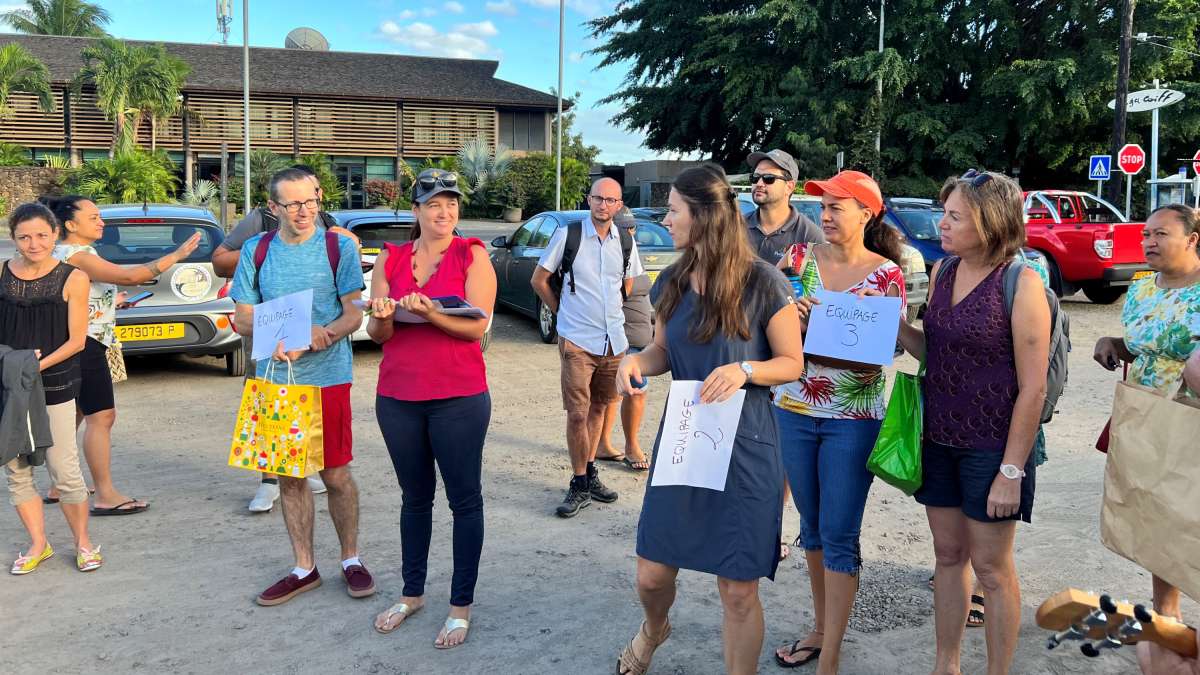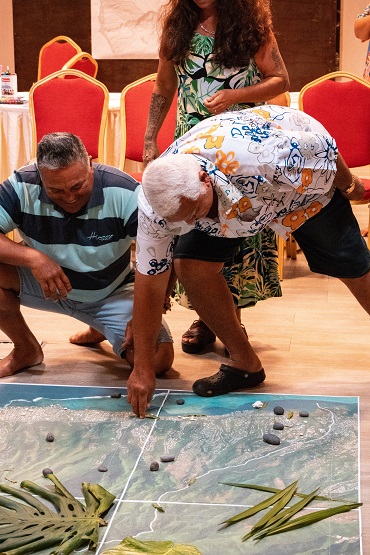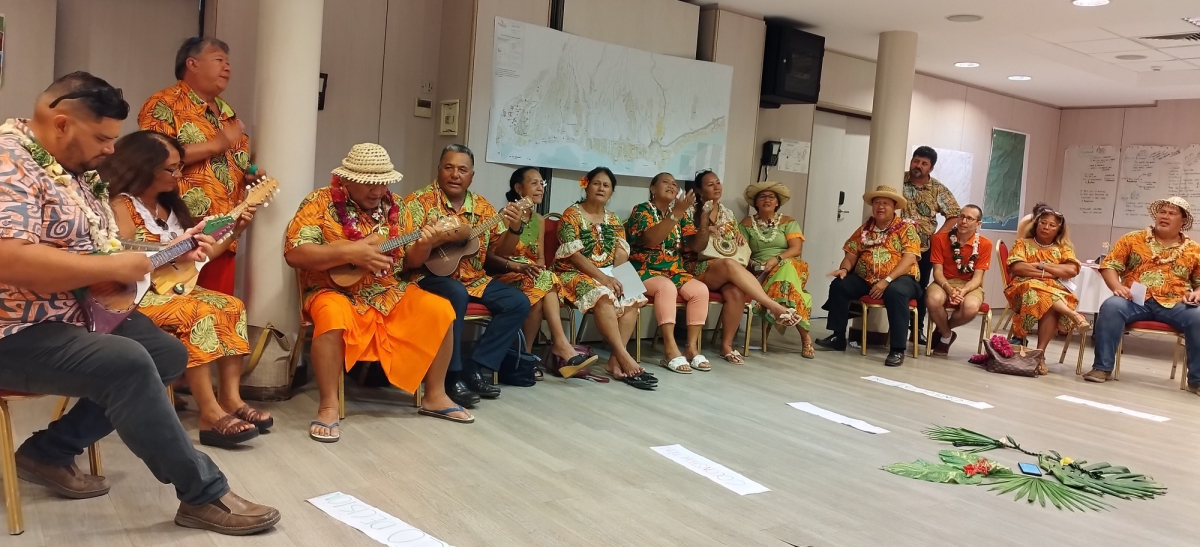
The commune of Punaauia, with a population of 29,103, is the most densely populated commune in the Papeete conurbation on the island of Tahiti. It is an attractive and changing community, but its living environment is under threat from the growing need to adapt to climate change.
The Mayor of Punaauia wanted to seize the opportunity to launch a review of the commune's General Development Plan (PGA) in order, at the same time and over a longer period of time, to set out the terms of his ambition for a territorial project that would control its urbanisation, promote resilience and the nature/culture relationship, the backbone of the identity of Polynesian society.
A partnership between Punaauia and Cerema will run from 2023 to 2025, with the aim of developing and testing a support methodology for a concerted, resilient regional project. It will be co-produced with all the players involved, based on different scenarios for organising governance and the territorial project, with their advantages and disadvantages. The project, which is a demonstrator, is based on an innovative theme: the relationship between nature and culture, where bio-inspiration and the living can serve as a basis for reflection on the construction of adaptation models for areas vulnerable to climate change.
The launch of the project in July 2023 with an ambitious and highly successful seminar for elected representatives augurs a rich and interesting follow-up over the next two years.
Cooperating for better co-construction at the service of a learning region
For Cerema, the interest of this cooperation lies in the innovative and exemplary dimensions of the project, through :
- the nature/culture relationship and its link with the implementation of a concerted territorial project ;
- its deployment overseas, particularly in French Polynesia;
- the mobilisation of its demonstrative expertise in resilience, consultation, governance and bio-inspiration over a long period of time, enabling ambitious objectives for the region to be achieved.
Cerema wanted to organise its support in two consecutive phases in order to secure the methods of intervention on the ground and to set up the terms of the cooperation with the local authority upstream, from the first mission initiated in March 2023. This period of cooperation at the technical level, between the Cerema project team and that of the local authority, was an essential time for acculturation of the methods, and a necessary timeframe for the strategic validation of the cooperation, which began contractually in June 2023 and will end in December 2025.
The project will take place in 5 phases:
- Creating the conditions for collective commitment
- Issues for today and tomorrow - Entering into public consultation and co-construction
- Taking action - Levers and tools
- Operational maturity
- Evaluation, ownership and capitalisation
An elected seminar, the keystone of the process initiated

Aware of the major challenge of involving all the stakeholders, and first and foremost the municipality's elected representatives, the mayor decided to organise a seminar from 10 to 13 July 2023.
The Cerema project team travelled to Punaauia to prepare and co-host the seminar, and to match the results with the action to be taken as part of the revision of the PGA, and beyond that with the ambitions of the regional project. French Polynesia's agency for development and sustainable land-use planning was involved in the process. The emphasis was on initial involvement in the stakeholder eco-system, in particular with the technical departments of the Polynesian government.
The methodology co-developed with the Punaauia team incorporated major cultural elements of Polynesian society: the relationship with Time, the pirogue, the ocean, games....
The seminar took place over 3 1/2 days, like a voyage in a pirogue (the Va'a). The 'oro'a'ava ritual, a commitment by the parties present (elected representatives/technicians/ Cerema project team), sealed the terms of the journey around the ambition set by the mayor (the tavana), that of Balance for the territory and freedom of speech for the elected representatives. The song (the Ute), a structuring element of Polynesian culture and the power of its orality, was one of the objectives of the seminar proposed to the elected representatives on the final day.
A first day in the field - "embarking" - organised around four sea/land circuits enabled the elected representatives to share a common and sensitive view of their territory, to draw out their feelings, the basis of a narrative to continue to write, the first observations and issues written or drawn in their individual travel notebooks.
The aim of the second day was to "reach for the stars", with a sensitive cartography of the area, as a basis for understanding the challenges of the PGA, and a creative workshop on "Territoire rêvé 2040" (Dream Territory 2040) to identify initial intentions. On the third day, the elected representatives "sailed through the archipelago, working together" to collectively outline the ambitions for citizen participation at the heart of the AMP review.
Results and next steps
The level of commitment and cohesion shown by the elected representatives, in conjunction with the local authority's technical staff, was exceptionally high throughout the week-long seminar, which was particularly demanding in terms of the expected co-production. The success of the first group trip to Va' laid the foundations for a strong willingness to engage with the region's stakeholders, to give the Tahitian language its rightful place among elected representatives, and during the consultation and co-construction sessions with the local population.
This first stage, which was decisive for the rest of the project, made it possible to identify points of consensus: controlling urbanisation in relation to the central and specific issue of Polynesians' relationship with land, preserving natural areas, the key role of the town of Punaauia within the large conurbation, the need to involve the inhabitants in a shared territorial project that respects the relationship between nature and culture....
Cooperation is continuing between Cerema and the municipality as part of the next stages, which will henceforth be part of the dynamic to which the municipality of Punaauia has committed itself through this trip to Va'a. For Cerema, this ambitious project will contribute to the results of the Action Research project "Drawing inspiration from the living for resilient territories", in which bio-inspiration and resilience are fundamental structuring factors for the municipality.


